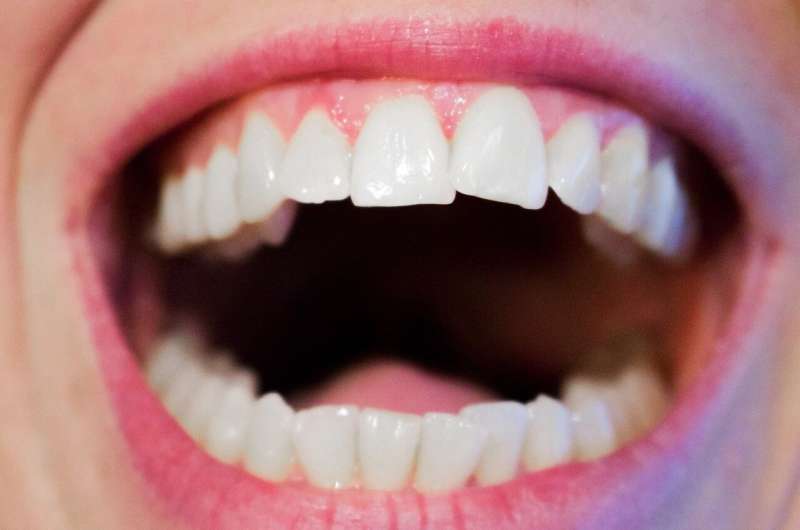More evidence of link between severe gum disease and cancer risk

Data collected during a long-term health study provides additional evidence for a link between increased risk of cancer in individuals with advanced gum disease, according to a new collaborative study led by epidemiologists Dominique Michaud at Tufts University School of Medicine and Elizabeth Platz of the Johns Hopkins Bloomberg School of Public Health and Kimmel Cancer Center.
The study, published in the Journal of the National Cancer Institute, used data from comprehensive dental exams performed on 7,466 participants from Maryland, Minnesota, Mississippi, and North Carolina, as part of their participation in the Atherosclerosis Risk in Communities (ARIC) study who were then followed from the late 1990s until 2012. During the follow-up period, 1,648 new cancer cases were diagnosed.
The research team found a 24 percent increase in the risk of developing cancer among participants with severe periodontitis, compared to those with mild to no periodontitis at baseline. Among patients who had no teeth— which can be a sign of severe periodontitis—the increase in risk was 28 percent. The highest risk was observed in cases of lung cancer, followed by colorectal cancer.
When the researchers did sub-group analyses, they found that participants with severe periodontal disease had more than double the risk of developing lung cancer, compared with no/mild periodontitis. An 80 percent increase in risk of colon cancer observed for participants who were edentulous at baseline, which is consistent with prior findings, and among never smokers, a two-fold higher risk was noted for participants with severe periodontitis, compared to those who had no/mild periodontitis.
"This is the largest study addressing the association of gum disease and cancer risk using dental examinations to measure gum disease prior to cancer diagnosis," said first and corresponding author Dominique Michaud, Sc.D., professor of public health and community medicine at Tufts University School of Medicine. "Additional research is needed to evaluate if periodontal disease prevention and treatment could help alleviate the incidence of cancer and reduce the number of deaths due to certain types of cancer."
Michaud noted that the findings were particularly interesting in light of research, including a recent study in Science, which determined that colorectal cancer tissues contain bacteria that are present in the mouth, including bacteria that have been associated with periodontal disease.
The researchers also uncovered a small increase in the risk of pancreatic cancer in patients with severe periodontitis. Although not significant statistically, the association has been seen in other similar studies, including a number of studies led by Michaud of Tufts.
The research team accounted for the impact of smoking among the participants, since people who smoke are more likely to get periodontal disease, and smoking raises the risk of lung and colon cancers.
"When we looked at data for the people who had never smoked, we also found evidence that having severe periodontal disease was related to an increased risk of lung cancer and colorectal cancer," said Elizabeth Platz, Sc.D., deputy chair of the department of epidemiology at the Johns Hopkins Bloomberg School of Public Health and co-leader of the Cancer Prevention and Control Program at the Johns Hopkins Kimmel Cancer Center.
The ARIC data were especially useful to study because unlike most previous research linking gum disease and cancer risk, periodontitis cases were determined from dental examinations performed as part of the ARIC study rather than participants' self-reports of the disease. The dental exams provided detailed measurements of the depth of the pocket between the gum and tooth in several locations in the mouth. The ARIC data include both Caucasian and African-American participants.
The researchers found no links between increased risk of breast, prostate or blood/lymphatic cancer and periodontitis. The link between periodontitis and increased cancer risk was weaker or not apparent in African-American participants from the ARIC study, except in cases of lung and colorectal cancer. "Additional research is needed to understand cancer-site specific and racial differences in findings," wrote the authors. The researchers caution that the study was limited in size for subgroup analyses, and less common cancers. The findings, however, suggest the need for further study.
Michaud and Platz said the study also points to the importance of expanding dental insurance to more individuals. "Knowing more about the risks that come about with periodontal disease might give more support to having dental insurance in the way that we should be offering health insurance to everyone," Platz said.
Advanced gum disease, also called periodontitis, is caused by bacterial infection that damages the soft tissue and bone that support the teeth. Previous research has shown a link between periodontitis and increased cancer risk, although the mechanism connecting the two diseases is still uncertain.
More information: Dominique S Michaud et al, Periodontal Disease Assessed Using Clinical Dental Measurements and Cancer Risk in the ARIC Study, JNCI: Journal of the National Cancer Institute (2017). DOI: 10.1093/jnci/djx278
















